Family is an important part of French culture. In this article, you can learn how to talk about your own family in French.
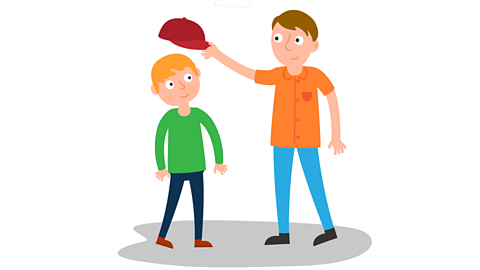
How to say 'I have' in French
If you want to talk about your family, the verb Check your connection, refresh the page and try again. (to have) is useful.
Avoir is an irregular verb. Regular verbs follow the same pattern, but irregular verbs donβÄôt.
The spelling of the verb will often be different for each person doing the action, so you need to remember the different forms:
| French | English |
|---|---|
| Check your connection, refresh the page and try again. | I have |
| Check your connection, refresh the page and try again. | He has |
| Check your connection, refresh the page and try again. | She has |

So you can say what family you have:
- Check your connection, refresh the page and try again. βÄ™ I have a mother
- Check your connection, refresh the page and try again. βÄ™ I have a father
To talk about more than one family member, you can also use the useful conjunction et which means 'and'.Conjunctions are joining words that link together parts of a sentence:
- Check your connection, refresh the page and try again. βÄ™ I have a mother and a father
- Check your connection, refresh the page and try again. βÄ™ I have a sister and a brother

How to say 'I don't have' in French
If you don't have a brother or sister, you need the negative form of avoir.
To make a sentence negative, you add ne or n' (before a vowel) before the verb and pas after the verb.
So Check your connection, refresh the page and try again. (I have) becomes Check your connection, refresh the page and try again. βÄ™ (I don't have).
- Check your connection, refresh the page and try again. βÄ™ I don't have a brother
- Check your connection, refresh the page and try again. βÄ™ I don't have a sister
Did you notice that in English, after 'I don't have' we say 'a brother' and in French, we say Check your connection, refresh the page and try again. - any brother?

Family members in French
Here are some words to help you talk about your family.
| French | English |
|---|---|
| Check your connection, refresh the page and try again. | a stepfather |
| Check your connection, refresh the page and try again. | a stepmother |
| Check your connection, refresh the page and try again. | a family |
| Check your connection, refresh the page and try again. | a brother |
| Check your connection, refresh the page and try again. | a mother |
| Check your connection, refresh the page and try again. | a father |
| Check your connection, refresh the page and try again. | a sister |
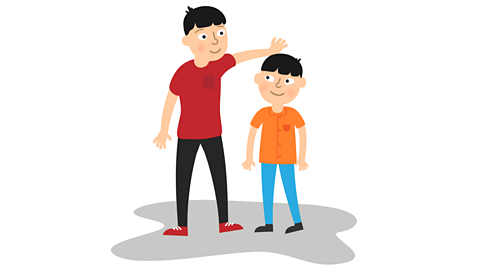
Did you know?
To say 'a big brother' in French, you say Check your connection, refresh the page and try again. and 'a big sister' is Check your connection, refresh the page and try again..
To say 'a little brother', you say Check your connection, refresh the page and try again. and 'a little sister' is Check your connection, refresh the page and try again..
- Check your connection, refresh the page and try again. βÄ™ I have a little brother and a big brother
- Check your connection, refresh the page and try again. βÄ™ I have a little sister and a big sister
Look at the sentences. Did you notice that sometimes Check your connection, refresh the page and try again. (big) and Check your connection, refresh the page and try again. (small) have an e on the end?
This is because they are adjectives. So if they are describing a feminine noun, like Check your connection, refresh the page and try again., they add e at the end to become feminine to match the noun.
You can learn more about this in the article on Adjectives.

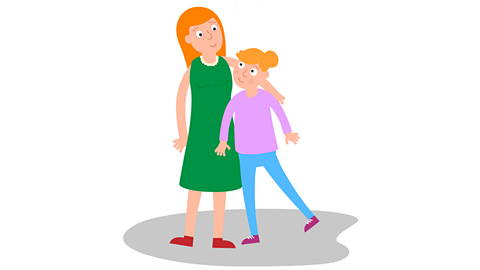
How to say 'my' in French
If you want to introduce someone from your family, you can say Check your connection, refresh the page and try again. - here isβÄΠ
- Check your connection, refresh the page and try again. βÄ™ Here is my mother
You use the possessive adjective 'my'. In French, this changes depending on whether the noun is masculine, feminine or plural. This is called an agreement.
So if the noun is masculine, like Check your connection, refresh the page and try again., the possessive adjective is Check your connection, refresh the page and try again.:
- Check your connection, refresh the page and try again. βÄ™ my father
If the noun is feminine, like Check your connection, refresh the page and try again., the possessive adjective is Check your connection, refresh the page and try again.:
- Check your connection, refresh the page and try again. βÄ™ my mother
If the noun begins with a vowel or h, like Check your connection, refresh the page and try again. or Check your connection, refresh the page and try again. the possessive adjective is Check your connection, refresh the page and try again.:
- Check your connection, refresh the page and try again. βÄ™ my friend (boy)
- Check your connection, refresh the page and try again. βÄ™ my friend (girl)
If the noun is plural where there is more than one family member, like Check your connection, refresh the page and try again., the possessive adjective is Check your connection, refresh the page and try again.:
- Check your connection, refresh the page and try again. βÄ™ my parents
| English | Masculine | Feminine | Before a vowel or -h | Plural |
|---|---|---|---|---|
| my | Check your connection, refresh the page and try again. | Check your connection, refresh the page and try again. | Check your connection, refresh the page and try again. | Check your connection, refresh the page and try again. |

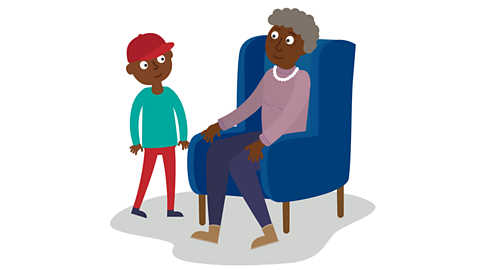
Try using some of these phrases to introduce your own family members:
Check your connection, refresh the page and try again. βÄ™ Here is my father
Check your connection, refresh the page and try again. βÄ™ Here is my mother
Check your connection, refresh the page and try again. βÄ™ Here is my brother
Check your connection, refresh the page and try again. βÄ™ Here is my sister
Check your connection, refresh the page and try again. βÄ™ Here are my parents
Check your connection, refresh the page and try again. βÄ™ Here are my grandparents

Here are some more words for members of your family.
| French | English |
|---|---|
| Check your connection, refresh the page and try again. | my cousin (boy) |
| Check your connection, refresh the page and try again. | my cousin (girl) |
| Check your connection, refresh the page and try again. | my grandmother |
| Check your connection, refresh the page and try again. | my grandfather |
| Check your connection, refresh the page and try again. | my grandparents |
| Check your connection, refresh the page and try again. | my uncle |
| Check your connection, refresh the page and try again. | my parents |
| Check your connection, refresh the page and try again. | my aunt |
Talking about your family in French
When you're talking about members of your family, you can tell people their names. You use the verb Check your connection, refresh the page and try again. βÄ™ to be called, which is a reflexive verb.
If a verb is reflexive, it means you are doing an action to yourself. It's like saying 'I call myself'. In front of these verbs, there is an extra word which makes it reflexive:
So when you're talking about your own name using je (I), there's a m' before the verb:
- Check your connection, refresh the page and try again. βÄ™ I am called (I call myself)
When talking about someone else's name using il (he) or elle (she), there's an s' before the verb:
- Check your connection, refresh the page and try again. βÄ™ He is called Joseph (He calls himself Joseph)
- Check your connection, refresh the page and try again. βÄ™ She is called Yasmin (She calls herself Yasmin)
Here are some more examples. Try changing the names and using the phrases to talk about your family members.
| French | English |
|---|---|
| Check your connection, refresh the page and try again. | She is called Mary |
| Check your connection, refresh the page and try again. | She is called Kate |
| Check your connection, refresh the page and try again. | He is called Anil |
| Check your connection, refresh the page and try again. | He is called Faisal |
Introducing your family in French
Using the phrases you have learnt so far to introduce someone, you can say:
Check your connection, refresh the page and try again. βÄ™ This is my father, he's called Faisal
Check your connection, refresh the page and try again. βÄ™ This is my mother, she's called Mary
Check your connection, refresh the page and try again. βÄ™ This is my brother, he's called Anil
Check your connection, refresh the page and try again. βÄ™ This is my sister, she's called Kate
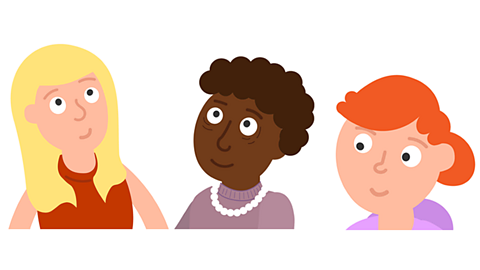
Did you know?
If you want to ask what someone is called, you say:
Check your connection, refresh the page and try again. βÄ™ What is he called?
Check your connection, refresh the page and try again. βÄ™ What is she called?
Did you notice that now the verb is in front of the person il and elle in the question?
There are also hyphens and the letter t to separate them. These help to make it easier to say.

Describing your family
To describe your family, you can say:
Check your connection, refresh the page and try again. βÄ™ In my family, there is my step-father, my mother and two brothers
Check your connection, refresh the page and try again. βÄ™ In my family, there is my father, mother and three sisters
Remember that if you have more than one brother or sister, then you need to add s to the noun.
- Check your connection, refresh the page and try again. (a brother) βÄ™ Check your connection, refresh the page and try again. (two brothers)
- Check your connection, refresh the page and try again. (a sister) βÄ™ Check your connection, refresh the page and try again. (two sisters)
Try describing your own family.
Key French Sounds
Below are some important French sounds that you have heard in this topic. Try practising them yourself out loud.
- an, am and en
The letters an make a nasal sound. This is when air comes down your nose as well as through your mouth. Imagine the sound of an old-fashioned car horn. The e at the end of the word is silent.
- Check your connection, refresh the page and try again. βÄ™ my grandfather
- Check your connection, refresh the page and try again. βÄ™ my grandmother
Also written as an, em and en
- e
There are different ways of saying and writing e in French.
In the word Check your connection, refresh the page and try again. (my brother) the letter e in the middle of the word has an accent line on it. It sounds like the e in 'egg'.
This sound can also be written as e before two consonants, ΟΣ, ai, aΟ°, ei and e before a final c, l or t.
- Check your connection, refresh the page and try again. βÄ™ my father
- Check your connection, refresh the page and try again. βÄ™ my mother
The e at the end of the word is silent.
Also written as Ο®, ΟΣ, ai, aΟ°, ei and e before a final c, f, l and t
- ≤’≥ή
In the middle of the word for Check your connection, refresh the page and try again. (my sister), there are three vowels ≤’≥ή. Imagine that you have seen something unpleasant, open your mouth a little and sound disgusted.
The letters ≤’ and eu also make this sound.
- Check your connection, refresh the page and try again. βÄ™ my sister
Bitesize Primary games. game
Play fun and educational primary games in science, maths, English, history, geography, art, computing and modern languages.

More on Topics
Find out more by working through a topic
- count4 of 12

- count5 of 12

- count6 of 12

- count7 of 12
